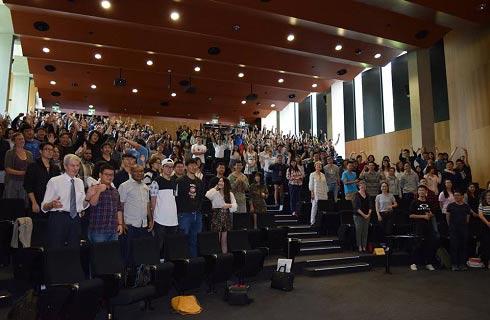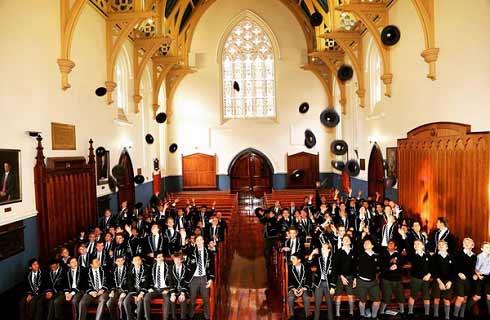英国文学和哲学学士(荣誉)学位
BA (Hons) English Literature and Philosophy

学历文凭
Bachelor Degree with Honours

专业院系
English Studies

开学时间

课程时长

课程学费

国际学生入学条件
IDP—雅思考试联合主办方

雅思考试总分
6.5
- 雅思总分:6.5
- 托福网考总分:80
- 托福笔试总分:
- 其他语言考试:Pearson Academic PTE - 62 (with no less than 59 in each Communicative Skill) Cambridge C2 Proficiency or C1 Advanced - 176 with a minimum of 169 per component
CRICOS代码: QV35
申请截止日期: 请与IDP联系 以获取详细信息。
课程简介
Studying a range of literary and philosophical texts from medieval times to the twenty-first century, this degree explores the interconnected relationship between English literature and philosophy and challenges the way you think about the world.,If you’re fascinated by literature from different cultures and times and have an interest in the big questions about how the world works and what makes us human, this course could be for you. The Joint Honours in English Literature and Philosophy is a thought-provoking, cross-disciplinary degree that will challenge the way you think about the world. It develops your skills, knowledge and understanding across the two subjects through the study of a range of philosophical and literary texts, important concepts, questions, arguments and methods. The syllabus is equally weighted between the two subjects with modules such as Theory and Practice of Literary Criticism exploring the intellectual connections between the two areas. You will be taught by subject experts with wide-ranging specialisms across both disciplines. Course content is informed by the research expertise of teaching staff which keeps the course relevant and up to date. You can also apply to add a placement year or a year abroad to your degree; this would increase the course from three years to four.In the first year you will build a strong foundation in both disciplines. The course broadens out in the second year, offering a wide selection of optional modules that give you plenty of opportunities to tailor the course to your interests. In the final year you will research and produce a dissertation on an area of your choice in either subject area. You also have the flexibility to choose optional modules from both subjects which allows you to follow your areas of specialisation in greater depth.Course structureYear 1 modulesCore modules:Introduction to Drama introduces the work of, and critical debate about, a wide historical range of drama and dramatists writing in English, typically covering work from the following areas: the medieval, early modern, Restoration and Augustan, Romantic, Victorian, and twentieth and twenty-first century: post-medieval dramatists to be covered might include, Marlowe, Shakespeare, Behn, Gay, Shelley, Wilde, Shaw, Beckett, Kushner and Butterworth.Introduction to the Novel introduces ways of reading English novels and various contexts for studying them. You will be familiarised with strategies for engaging with fictional texts formally as well as historically, by situating the novels studied in their distinctive cultural environments while also being taught the ways in which novelistic form and technique have changed over time.Introduction to Poetry introduces a wide range of poems by poets writing in English from the early modern to the contemporary periods including some American poetry. You will develop your understanding of traditional major verse forms, modes of organisation and genres (e.g. blank verse, the couplet, the stanza, lyric, elegy, sonnet, epic, pastoral, ode, open form).Ethics and Values provides a structured introduction to moral philosophy, including applied ethics, by exploring key moral concepts and showing how they influence moral practices and theories.Knowledge and Reality introduces philosophical problems in epistemology (the study of knowledge), and metaphysics (the study of reality and ourselves).Reading Philosophy allows you to acquire an understanding of the issues of interpretation and comprehension in reading primary authors, through a detailed study of four thematically related texts.Year 2 modulesCore modules:Theory and Practice of Literary Criticism introduces the presuppositions and principles of literary criticism and issues of knowledge, value and ideology arising from the practice of reading. You will develop an independent critical sense in your own practice of reading, contextualised against the history of theory and criticism.
相关申请
 预科
预科 奖学金
奖学金 实习机会
实习机会 在校学习
在校学习 跨境学习
跨境学习 校园授课-线上开始
校园授课-线上开始 在线/远程学习
在线/远程学习
开学时间&学费
学费信息仅供参考,请与IDP联系以获取详细信息
| 开学时间 | 时长 | 学费 | 地点 |
|---|
学校排名

世界排名114
数据源:
泰晤士高等教育世界大学排名
关于杜伦大学

杜伦大学创建于1832年,是英国历史最悠久的大学之一。杜伦大学建于中世纪世界遗产地旁,有着悠久的历史和现代价值观,是一座备受推崇并拥有前瞻性思维的学府。如今,来自世界各地的18000多名学生在达勒姆就读。杜伦大学有28个系,开设有200多门本科和研究生课程。该校很多教师都处于各自领域的最前沿。教职人员利用出色的研究和学科知识为所有学生提供优质的教学。目前,杜伦大学有17个学科在全球大学中名列前100位,其中九个学科名列前50位。除了在学术上的卓越成就,该校还努力为学生提供支持,帮助他们在毕业后获得有意义的工作。其毕业生就业能力目前在世界上排名第88位。该校的就业与创业中心致力于培养学生的专业技能,并提供商业人脉和工作机会。杜伦大学目前在2020年《QS世界大学排名》中名列第78位,稳稳跻身全球大学百强之列。该校为教职人员和学生创造了一个热情友好的多元化社交环境,并因此而倍感自豪。目前,杜伦大学28%的在校生为非英国本土学生。大学社区处在独一无二的达勒姆求学体验的核心位置,达勒姆的每个社区均是多元化、多学科的社区,由来自不同背景和文化的学者、学生和工作人员组成。有了这些社区,加上该校杰出的支持体系,学生们一定会有宾至如归之感,并可参与大量精彩的课题。
本校相关课程

博士神学与宗教
学历文凭
Ph.D.
开学日期
课程费用总额


MLitt神学与宗教
学历文凭
Masters Degree (Taught)
开学日期
课程费用总额


博士学位论文博士学位
学历文凭
Ph.D.
开学日期
课程费用总额


理学硕士心理学研究
学历文凭
Masters Degree (Research)
开学日期
课程费用总额


研究心理学硕士
学历文凭
Masters Degree (Research)
开学日期
课程费用总额


博士哲学
学历文凭
Ph.D.
开学日期
课程费用总额

其他相关课程

中学11年级和12年级
 马特·克里斯蒂学院
马特·克里斯蒂学院学历文凭
Secondary School
开学日期
课程费用总额


应用语言学硕士-应用语言学
 昆士兰大学
昆士兰大学泰晤士高等教育世界大学排名:80
学历文凭
Masters Degree (Coursework)
开学日期
课程费用总额


国际研究学士-中文
 昆士兰大学
昆士兰大学泰晤士高等教育世界大学排名:80
学历文凭
Bachelor Degree
开学日期
课程费用总额


脑与精神科学研究生文凭
 悉尼大学
悉尼大学泰晤士高等教育世界大学排名:54
学历文凭
Graduate Diploma
开学日期
课程费用总额


脑与精神科学研究生证书
 悉尼大学
悉尼大学泰晤士高等教育世界大学排名:54
学历文凭
Graduate Certificate
开学日期
课程费用总额


脑与精神科学硕士
 悉尼大学
悉尼大学泰晤士高等教育世界大学排名:54
学历文凭
Masters Degree (Coursework)
开学日期
课程费用总额










 英国
英国